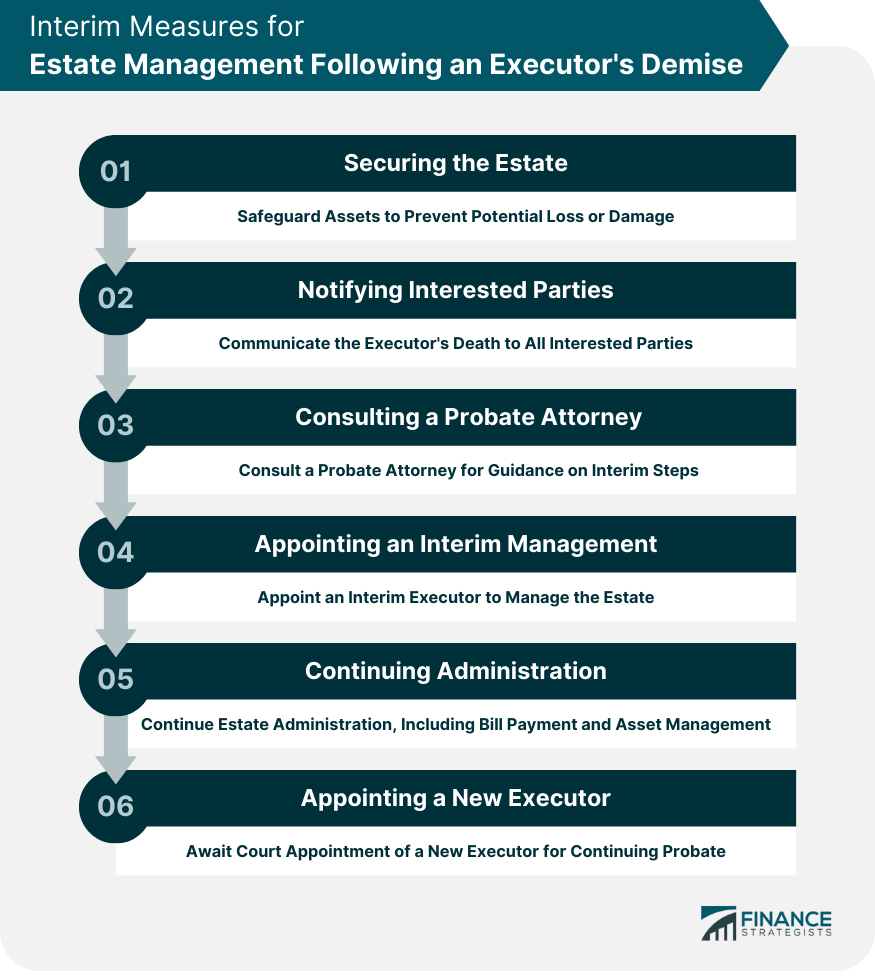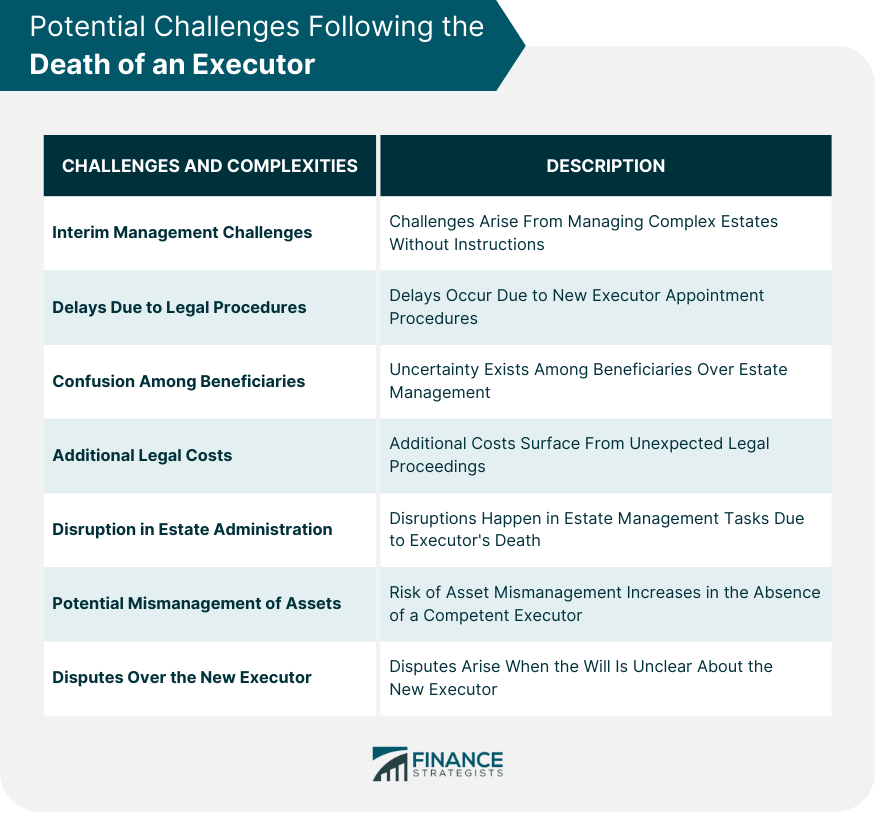An executor is an individual appointed to manage the estate of a deceased person, generally specified in their will. The executor has a significant role, ensuring that the deceased's assets are distributed to the beneficiaries as per the will. This includes initiating probate, managing assets, settling debts and taxes, and distributing the remaining assets. In cases where no will exists, the court designates an executor, often referred to as an administrator. The role of an executor, which can be a family member, friend, or a legal professional, demands trust and responsibility. They may need to collaborate with legal and financial experts to fulfill their obligations legally and ethically. This role is vital as its proper execution can prevent legal disputes, minimize delays, and ensure a smooth transition of the deceased's assets, offering peace of mind to the grieving family. If an executor passes away before completing the probate process, the circumstances and local jurisdiction laws determine the next steps. Typically, the court has the authority to appoint a new executor to manage the estate, preferably an alternate executor if named in the will. In situations where the will names multiple executors, or co-executors, the remaining executor(s) can usually continue the probate process if one passes away, without the need for court intervention. However, if there's no alternate executor named and no co-executors, the court generally follows a standard procedure to appoint a new executor, often choosing a close relative of the deceased or the main beneficiary of the will. Given the complexity of probate laws, it's advisable to seek legal guidance if the appointed executor dies during the probate process. A probate attorney can offer advice tailored to the specific circumstances and applicable laws in the relevant jurisdiction. The probate process does not halt indefinitely due to the death of an executor. There are established laws and procedures to ensure the smooth continuation of estate administration. When the executor of an estate passes away during probate, there is an interim period before a new executor is appointed. The handling of estate matters during this time is crucial to prevent any loss, mismanagement, or disruption of the estate's affairs. Here are the steps to handle estate matters in the interim: Securing the estate is the immediate step following the executor's death. This involves safeguarding all assets linked to the estate to prevent potential loss, theft, or damage. If the estate includes physical properties, they should be locked and secured. Financial assets may need to be placed under temporary management to ensure they remain safe and properly managed. Next, all parties interested in the estate should be notified of the executor's death. This includes beneficiaries, the court, and any creditors associated with the estate. Providing clear, timely communication maintains trust among all parties involved, ensures transparency, and keeps everyone informed about the progress of the estate administration process. Given the complexities of estate and probate law, consultation with a probate attorney is crucial. An attorney can help understand the implications of the executor's death and provide guidance on the steps to be taken during the interim period. They can also offer advice on the process of appointing a new executor. Depending on local laws and the specifics of the estate, the court may appoint an interim executor or administrator. This person assumes the deceased executor's duties, ensuring the ongoing management of the estate until a new, permanent executor is appointed. The interim period should not halt the administration of the estate. Tasks such as paying ongoing bills, collecting any income owed to the estate, maintaining properties, and managing investments should continue. By doing so, the value of the estate is preserved and any potential legal or financial issues that could arise from neglect are prevented. Eventually, the court will appoint a new executor. This could be an alternate executor named in the will or, if no such person is named, someone appointed according to the court's standard procedure. This new executor will then assume full responsibility for managing the estate and carry on with the probate process. When the executor of an estate passes away, a temporary, or "interim," executor may need to be appointed to manage the estate until a new executor is officially named. This process can be challenging, particularly if the deceased executor did not leave clear instructions or if the estate is complex. The interim executor must quickly take stock of the estate's assets and liabilities, secure property, handle communications, and maintain any ongoing obligations, such as mortgage payments or insurance premiums. The process of appointing a new executor can result in considerable delays in probate proceedings. Courts often have specific procedures that must be followed, including notifications, hearings, and paperwork. If a new executor is not immediately available or if there are disputes about who should be appointed, the process can be further delayed. This can prolong the distribution of assets to beneficiaries and increase the overall costs associated with probate. Beneficiaries, or those who are set to inherit from the estate, may experience confusion and stress when an executor dies during probate. They may have concerns about who will manage the estate, how this will affect the distribution of assets, and whether their interests will be properly protected. Additionally, they may be unsure of their rights, responsibilities, and the next steps in the probate process. The unexpected need to appoint a new executor can result in additional legal costs. These might include court fees for the appointment process, legal consultation fees, and possibly litigation costs if disputes arise. If the estate does not have sufficient liquid assets to cover these costs, it may be necessary to sell some assets, potentially reducing the value of the estate for beneficiaries. The administration of an estate involves many tasks, from managing and maintaining assets to paying debts and taxes. When an executor dies, these tasks can be disrupted, potentially leading to financial and legal complications. For example, if bills or taxes are not paid in a timely manner, the estate may incur penalties or interest charges. If assets are not properly managed, they may decrease in value. An important part of an executor’s role is to manage the estate's assets responsibly and efficiently. If there is an interim period without a competent executor, there is a risk of mismanagement. This could include failure to secure assets, poor investment decisions, or a lack of proper accounting for assets. Mismanagement can lead to a decrease in the value of the estate, impacting the amount available for distribution to beneficiaries. If a will does not name a successor executor or if the named person is unwilling or unable to serve, the court will need to appoint someone. If there are multiple potential executors, such as several adult children of the deceased, this can lead to disputes. These disputes can cause delays, increase legal costs, and create tensions among family members or other beneficiaries. In some cases, these disputes may lead to litigation, further complicating the probate process. The death of an executor before probate completion introduces complexities requiring a new executor's appointment via either the will's provisions or court intervention. Such an event could delay probate due to necessary successor identification and legal paperwork amendments. A pre-nominated alternate executor in the will eases this transition. However, if no such individual exists, the court's role becomes central, appointing an executor following intestate laws or established procedures. In scenarios lacking a will and a nominated backup executor, a court-appointed administrator steps in. An interim special administrator may be designated during this period to protect estate assets. Subsequent to their appointment, the new executor must seek court approval to assume responsibilities. Potential obstacles may encompass heirs' disagreements, challenges to the newly appointed executor's legitimacy, estate settlement delays, and prolonged probate proceedings.What Is an Executor?
What Happens if the Executor Dies Before Probate?
Handling of Estate Matters in the Interim
Securing the Estate
Notifying Interested Parties
Consulting a Probate Attorney
Appointing an Interim Management
Continuing Administration
Appointing a New Executor

Potential Challenges and Complexities of Interim Management
Interim Management Challenges
Delays Due to Legal Procedures
Confusion Among Beneficiaries
Additional Legal Costs
Disruption in Estate Administration
Potential Mismanagement of Assets
Disputes Over the New Executor

Conclusion
What Happens if an Executor Dies Before Probate? FAQs
If the executor dies before probate, a successor executor is usually appointed to fulfill the executor's duties and responsibilities.
Yes, if a backup or alternate executor is designated in the will, they can assume the role of executor in the event of the primary executor's death.
In such cases, the court may appoint an administrator to handle the estate administration process according to intestate succession laws.
The court may appoint a special administrator to temporarily manage the estate and ensure the preservation of assets until a new executor is appointed.
Disputes among heirs and beneficiaries, as well as contests over the appointment of a new executor, can create legal complexities and potentially delay the settlement of the estate.
True Tamplin is a published author, public speaker, CEO of UpDigital, and founder of Finance Strategists.
True is a Certified Educator in Personal Finance (CEPF®), author of The Handy Financial Ratios Guide, a member of the Society for Advancing Business Editing and Writing, contributes to his financial education site, Finance Strategists, and has spoken to various financial communities such as the CFA Institute, as well as university students like his Alma mater, Biola University, where he received a bachelor of science in business and data analytics.
To learn more about True, visit his personal website or view his author profiles on Amazon, Nasdaq and Forbes.















